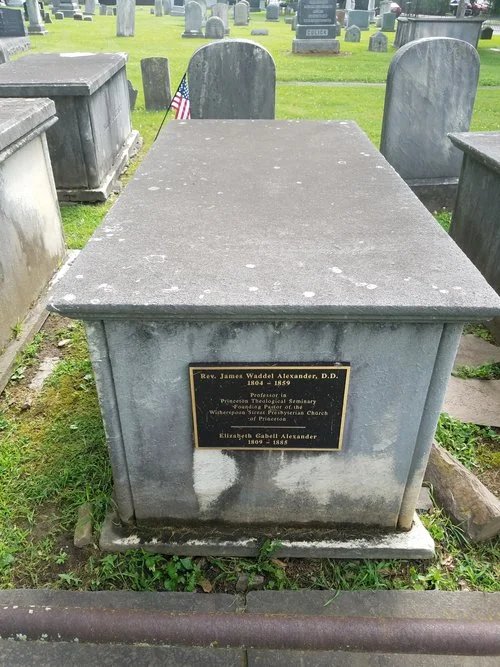(If the author links in this post are broken, please visit our Free PDF Library and click on the author’s page directly.)
In the spring of 1859, at the age of 55, the health of James Waddel Alexander began to decline. He made the decision to leave New York City, where he labored as pastor of the Fifth Avenue Presbyterian Church and head south to Virginia. It was thought that the curative effects of the western mountain springs could help to alleviate the chills he was experiencing. His long-time correspondent, John Hall, encouraged him to think about a trip out West, but Alexander determined to return to his home state (Alexander’s letter to Hall from Charlottesville, dated June 7, 1859).
Red Sweet Springs, as it appeared in 1867. Source: http://exhibits.hsl.virginia.edu/springs/redsweet/
In the mid-19th century, places such as Warm Springs in Bath County and Red Sweet Springs (also known Sweet Chalybeate Springs) in Allegheny County drew many visitors and patients seeking a return to good health. Alexander visited the Warm Springs Hotel first, arriving on July 13. His delight in seeing the mountains was evident during the days following. Dr. James L. Cabell, Professor of Comparative Anatomy and Physiology at the University of Virginia in Charlottesville, who accompanied him to the springs, reported that:
In his daily drives, his enjoyments of our mountain scenery, which is unsurpassed for its varied beauty and grandeur, was almost rapturous. It had never before, he said, been half so great. He would repeatedly say that he had no language of his own adequate to the expression of his feelings, and could only exclaim with the Psalmist: ‘Oh that men would praise the Lord for His goodness and for His wonderful works to the children of men.’
Dr. Cabell also reported that Alexander experienced an immediate boost in his health, but that he was also anxious to move on to Red Sweet Springs. On July 20, Alexander commenced the next leg of his trip, but had to stop for the night due to the onset of extreme physical pain while traveling on a hot Virginia road. Dysentery began to afflict him that night. The next day he made it to the Red Sweet Springs. But over the course of the following week, he battled a fever, and the dysentery took its toll on his body too. Although the proprietor of the cottage he stayed at, the doctor, and others, made every effort to provide comfort and aid, Alexander realized that he was coming to the end of his mortal journey. Before the end came, according to Cabell, Alexander said:
I have not been in the habit of talking much on the subject of my own spiritual states of feeling. With respect to my subjective religion, I have often disappointed people who look for manifestations of a certain kind. But I have frequently made known to Elizabeth [his wife] the grounds of my hope…Let me say one word more with respect to the solemn event to which you have called my attention. If the curtain were to drop now, and I were this moment ushered into the presence of my Maker, what would be my feelings? They would be these: first, I would prostrate myself in an unutterable sense of my nothingness and guilt; but, secondly, I would look upon my Redeemer with an inexpressible assurance of faith and love. A passage of Scripture which expresses my present feeling is this: “I KNOW WHOM” (with great emphasis) “I have believed, and am assured that he is able to keep that which I have committed to him against that day.
These words were uttered by Alexander about 20 hours before he breathed his last at around 5:00 am on the Lord’s Day, July 31, 1859. Thus did he, who had brought such consolation and comfort to many during his ministry, enter into the presence of the Lord whom he loved.
J.W. Alexander’s grave at Princeton Cemetery (photo by R. Andrew Myers).
Alexander’s body was transported from Red Sweet Springs, Virginia and buried some days later at Princeton Cemetery, where his father Archibald Alexander, and later his brother Joseph A. Alexander, were also laid to rest. Last year, this writer paid a visit to his grave. Today, we remember a prince in Israel who died exactly 160 years ago.


